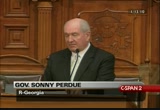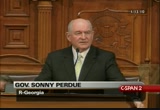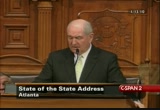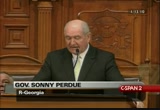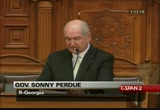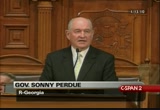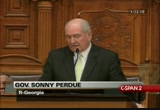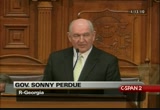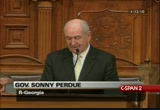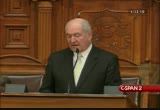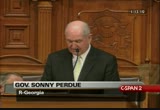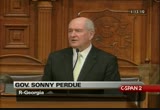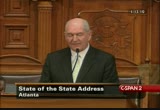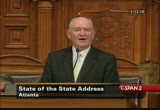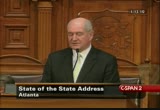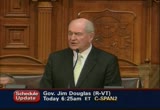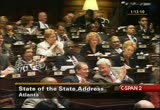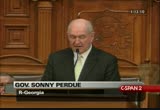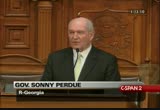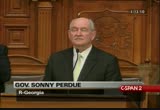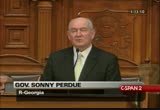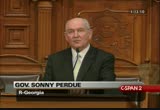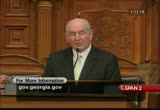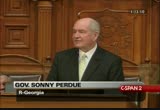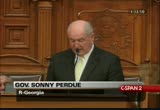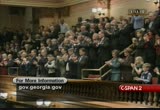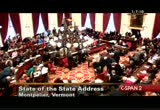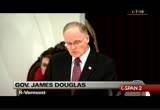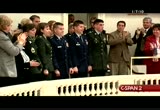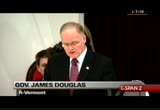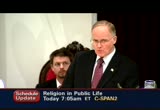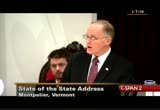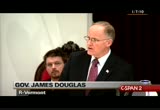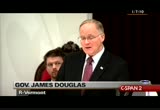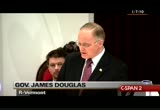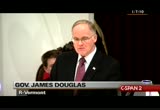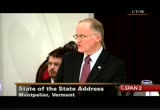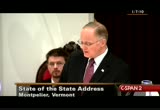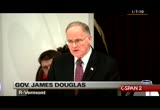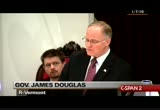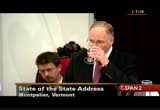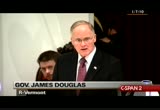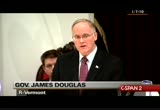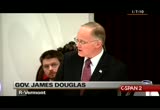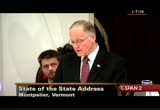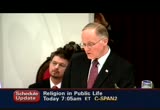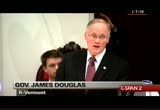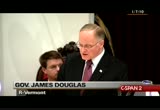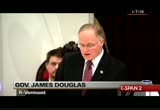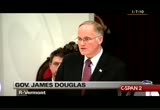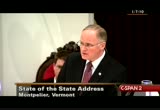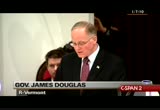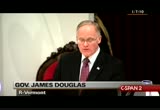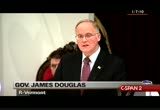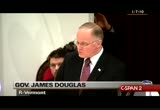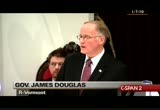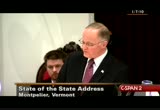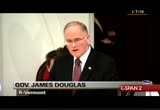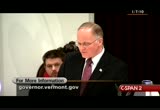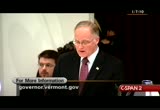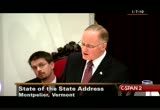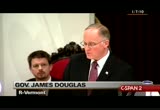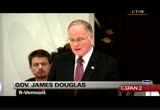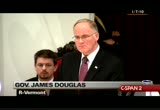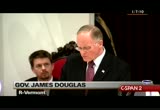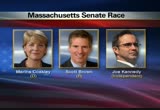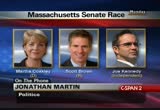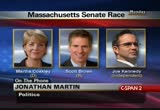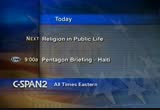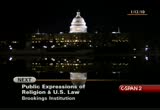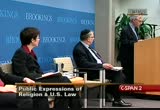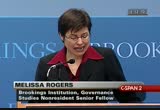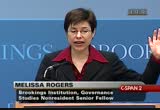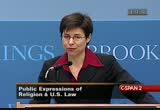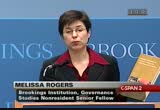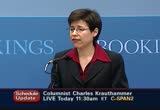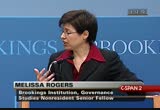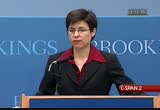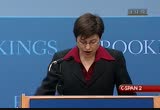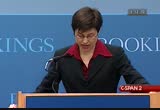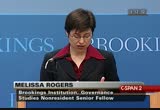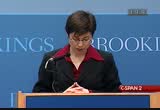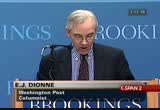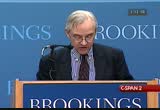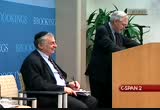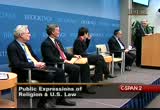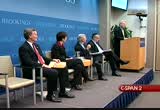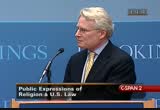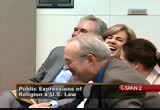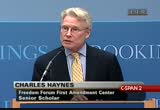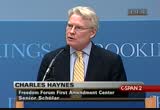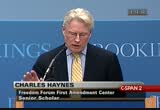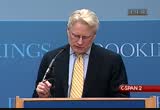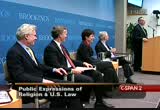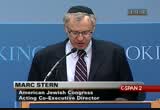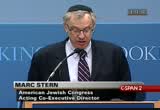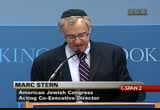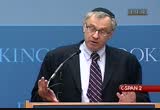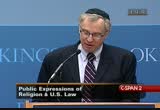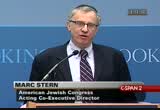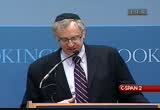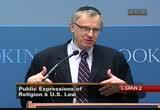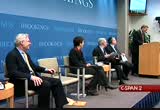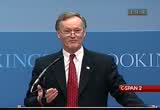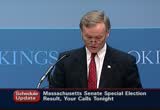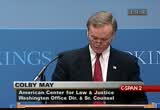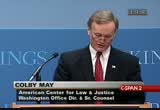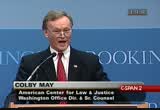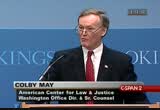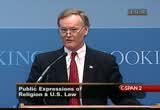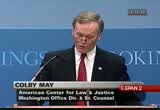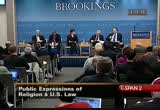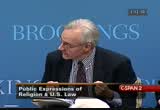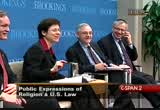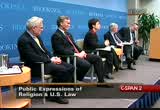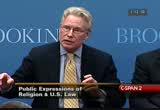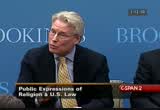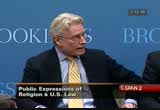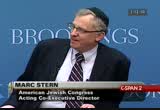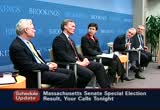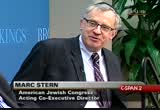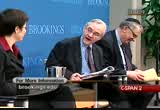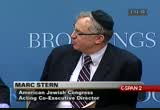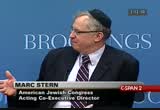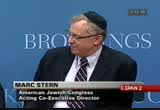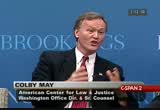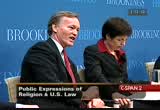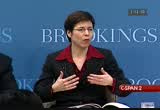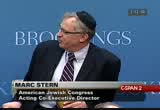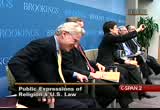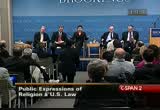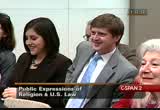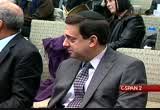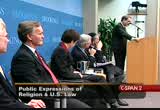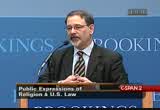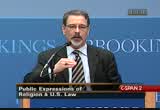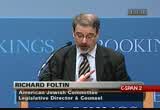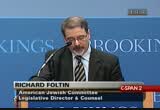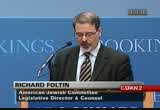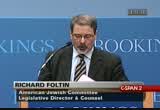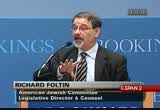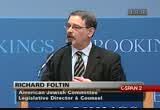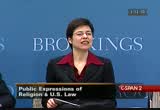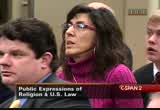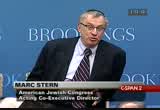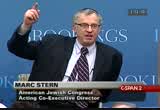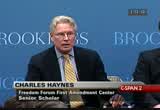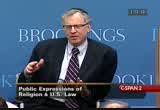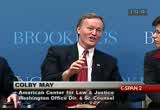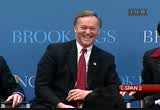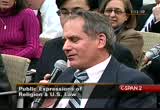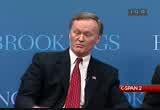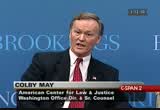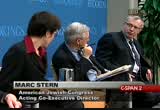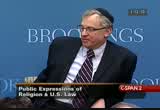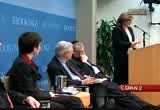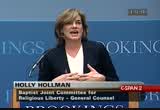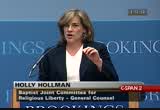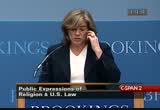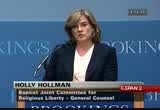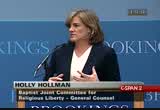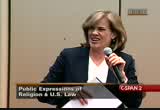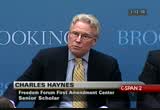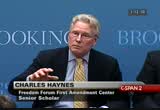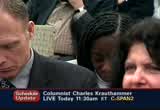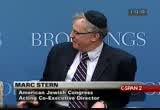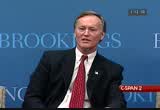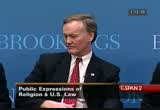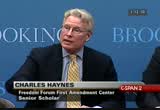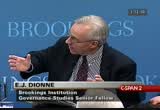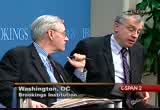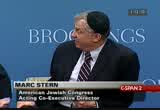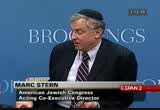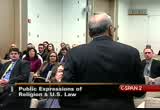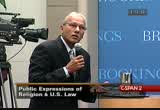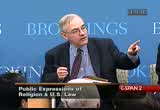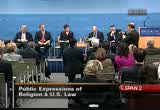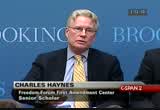tv Today in Washington CSPAN January 19, 2010 6:00am-9:00am EST
7:00 am
we can put the program on a sustainable course preserving it for those who need it the most. [applause] >> i recognize that changes to the income sensitivity program will impact some taxpayers but bringing commonsense to this subsidy is an essential step to reducing the overall cost of education in providing real property tax relief for all in the years to come. in fact, if in fact sensitivity payments a were not increased this year, there would be no increase in the residential property tax rate. our goal must be to reduce the need for exemptions over time with responsible school spending
7:01 am
decisions and a robust tax base that allows for lower rates. my proposals for education reform go to the heart of run-away spending and taken together stop the projected 2-cent increase plus drop the rates by another penny. compared by a system left unreformed my proposal will result in $33 million in lower property taxes, a welcome break for taxpayers. [applause] >> as we work to reform education financing and bring balance back to our system, we can't lose sight of our underlying purpose, to provide high quality learning opportunities at a cost that doesn't strangle our economy. forcing our children to leave in search of jobs, taking our education investment with them. throughout vermont efforts will help students. we must always be on the lookout for new ways to ensure our system of education is serving the needs of today's students. currently, vermont schools are prohibited by law from accessing
7:02 am
out of state distance learning programs. this is a barrier to a student who, for example, is interested in learning chinese while earning credits towards graduation. if a school sought to provide a new chinese program for this student or even a group of students they'd have to hire a new teacher with the expertise, a costly step. allowing students to access approved distance learning programs from around the country is a simple, affordable change we can make to improve quality and increase opportunities. and it's a change that complements our efforts to wire schools and apply new technologies to the classroom. no longer can we settle for the old paradigm that says the only way to improve education is to spend money to hire a teacher for a classroom. instead new thinking, creative ideas and an impulse towards change that excites, empowers and improves the education of our kids must guide in constantly reforming education in vermont. in all our efforts, vermonters
7:03 am
will judge us on the sum of the work not parts. they will judge us on our ability to get our economy moving again and on our ability to work together and craft a sustainable budget. if ever there were a time in our state's history for public servants to join together and to dedicate ourselves completely to the economic strength and individual prosperity of our people, that time is now. as a young man 37 years ago, i took my seat in this assembly for the first time. i listened as governor davis bid farewell to the office that i'm now so honored to hold. that morning the departing governor spoke of a foundation rooted in responsibilities, efficient government and environmental protection. but that foundation was not an end in itself. rather, it served to help vermonters face a fundamental question he posed. how shall we preserve the vermont way of life? like all under this golden dome, i've shared in the joys, sorrows, accomplishments and disappointments of daily life
7:04 am
here and across our state. i've been a firsthand witness to and participant in that vermont way of life. i've seen it in a neighbor stack wood or pull a car from a deep rut in mud season, i've heard it in town meeting debaste and deployment speeches. i felt it on the coldest winter night and on the windy autumn day. i've noted it in a firefighter or a church deacon or the anonymous volunteer just doing her part to better the community with no expectation of thanks. the vermont way of life is something not easily defined. it's rooted in a common decency and an eternal hope for a better future. it's a shared love for this land and a respect for one hoot and i can attest it's something worth preserving, something worth defending, something worth fighting for. as we embark on the road ahead, let us all take strength and comfort in the knowledge that others who come before have succeeded in keeping for this
7:05 am
generation the promise of vermont. but let us be humbled in the understanding that it is our duty to keep that promise for those who follow. may god bless each and every one of you and the great state of vermont. thank you all very much. [applause] >> the special election to fill the massachusetts senate seat of the late at the time tendon is today a. -- ted kennedy. you'll see and hear the candidates tonight on the c-span networks. we talked about the reporter of the significance of the race. >> jonathan martin of politico is in massachusetts covering the senate race there. you write that the race could reshape the balance of power in washington. how would it do that? >> well, if scott brown, a republican, is elected that
7:06 am
means that the gop would have 41 seats ending the democrats filibuster-proof 60-seat majority in the senate. effectively what would mean democrats in the senate could not push legislation through in a fashion that they've been able to in the past few months since minnesota's senator al franken gave them that 60th seat. so it would basically be something of a roadblock, you know, before the democratic majority could stymie not just an immediate issue but a number of issues the democrats are hoping to pursue. >> what other agenda items are you talking about? >> well, for example, financial regulation of wall street. if they can get to an energy bill, if they can get to an immigration bill. those are just three items that, you know -- without having 60 seats could make it harder for democrats to pursue their agenda
7:07 am
this year. >> what about the midterm elections. how would had this raise affect that? >> well, there's the substantive impact, of course, the 41st vote i just mentioned and there's the symbolic impact. a larger political impact and that is what it would do to the psychology of the party. if they can't keep ted kennedy's seat and if they lose to a little known state senator up here, then what does that mean for democrats that come for more competitive districts, from more politically competitive states? it will really throw a scare, i think, into a lot of folks in the party and underscore the peril that they're going to face this fall at the ballot box. >> we've seen reports that this is the biggest single american election outside presidential politics in decades. how important is this race? >> well, i think it's very important for two reasons. the first one substance because of what it means for the senate democrats majority and secondly, because of what it would say% kind of year we're going to
7:08 am
have. all too often we read too much into special elections and what they mean. and we take too much of a pace. but because of the electorate up here on how they're behaving, very unhappy, very restless, i think it says something for where ats apparently nowhere ih can they win? >> jonathan martin of politico, thank you.
7:09 am
>> did you know that one of the top free news apps for your cell phone or itouch is c-span radio. now you can get quick and easy access to three streaming audio radios. there's also alur podcasts incla and "after words" and it's all free and available from the app store. >> now a discussion of public expressions of religion in the u.s. hosted by the brookings institution. panelists discuss religion and politics in the workplace. religious gatherings on government property and the use of chaplains in legislative bodies and the military. this is two hours. >> and so i want to introduce our very distinguished panel -- i'll introduce the other members later on. i want to start by introducing
7:10 am
my friend and colleague and a person for whom i have boundless respect and admiration, melissa rogers. i'm very proud to say that melissa is a nonresident senior fellow with the government studies department here at brookings. she also serves as director of wa wake for rest. and teaches church/state relations in the united states. in 2008 barely university press published a case book she co-authored "religious freedom and the supreme court." she previously served as the executive director of the pew forum on religion and public life and as general counsel of the baptist joint committee on public affairs. president obama appointed his counsel on partnerships in 2009. melissa has won many, many
7:11 am
awards but not nearly as many as she deserves. i present you with melissa rogers. [applause] >> good morning. and thanks to my friend, e.j., for that kind introduction. as you can tell, e.j. has such a way with words and he's always able to put his finger right at the heart of an issue. and i thank him for that very eloquent introduction. i also want to thank -- just as we get started darrell west, emily luken, john and christine for helping to assist in this event and encourage the work. additionally, i want to thank the wake for rest divinity school and all the people named on the final inside page of this booklet you have this day, bill, adam, susan and joey. without their support and assistance, this project wouldn't have come together. let me begin by highlighting --
7:12 am
taking you to the first inside page of this document where you will see the list of the members of the drafting committee of this document.8h and this project in particular the drafters are as important as the draft. i want to recognize all these distinguished leaders for their efforts. painstaking at times and their commitment to religious freedom. i'm going to call the names of the drafters who were able to join us today and if you wouldn't mind, just raising your hand when i call your name. nathan of the union of orthodox jewish congregation of america, richard of the american jewish committee, charles haynes of the freedom forum first amendment center, holly and brent of the baptist joint committee. we have a represent from the institute of religion and civic values, colby of the american center for law and justice. rabbi david of the religious action center for reform
7:13 am
judaism. a representative of the seek council on religion and education. mark of the american jewish congress, mitchell formerly of the general conference of seventh day adventist. and i hope i haven't missed any drafters in the audience. oh, isabelle, my goodness. thank you. isabelle. you changed your name recently but i'm so glad that you raised your hand here. isabelle richmond of the first freedom center a very valued drafter and came from richmond to join us this morning. thank you so much, isabelle for your participation in this project. well, again, what makes this statement particularly valuable is that it has been jointly drafted not only by a group that is quite diverse in religious terms but also diverse in terms of the church/state perspective represented. indeed, some on the drafting committee are actually on opposite sides of church/state litigation with some regulator.
7:14 am
the drafting committee for the statement includes, for example, a former staff member of the aclu, jeremy gunn and a current staff member of the american center of law and justice, colby may. and if experts like this can agree on what the law is, i think it commands our attention. now, as the document makes clear saying that these experts agree in many cases about what the law is is not to say that these drafters always agree about what the law should be. indeed, some of the members of the drafting committee are challenging in trying to push the law in different directions, the law that -- some of the law that's described in this booklet. but while this diverse group often disagrees about how the law should address legal issues, the drafters agree in many cases on what the law is today. and more fundamentally, the drafters agree that religious liberty or freedom of conscience is a fundamental, inalienable right of all people, religious and nonreligious, and that there
7:15 am
is a need to correct misunderstandings about this right. and indeed we've drafted this statement because i don't have to tell you that there's tremendous confusion about this area of the law. we hear broad inaccurate statements all the time. on the one hand the statement that somehow religion has been kicked out of the public square. on the other hand, the statement that there are no limits when government deals with religion or just one or two. so this statement is an effort to try to blow away those mischaracterizations to state what the current law is where we can together. and to educate people about that law. let me just say -- you may be wondering how did this motley crue come together to draft this statement? and so let me just give you a bit of background on the genesis of this project if you will. it began several years ago when the freedom forum first
7:16 am
amendment center, which is charles haynes a is associated with the first freedom -- the first amendment center of the freedom forum. he with the mccormick tribune freedom museum hosted a conference and brought many of us together to talk about the future of religious liberty. and at that conference we discussed some ways in which some previous joint statements of current law have helped us educate americans about church/state law. these statements -- some of you may remember were about religious expression in public schools. and charles played an instrumental role in the development of these statements as did mark stern who will speak in just a moment. so we talked about those statements. their usefulness and decided that it would be a good idea to draft another joint statement. this one addressing some issues of religious expression in the wider public square including religion and politics, religious
7:17 am
gatherings on government property, chaplains and legislative bodies, prisons in the military and religion in the workplace. i offered to convene and facility the process at wake for rest divinity school and it's safe to say there were times all of us doubted our sanity, we could agree it had a happy ending. let me also just note quickly that we have been fortunate to have a number of statements of endorsement for this project by a distinguished and diverse group of leaders. we asked a handful of leaders to endorse this statement and i'm very pleased that the president of the institutional freedom alliance who is one of those endorsers could be here with us too. well, let me just turn quickly to the document itself. we've divided the questions among ourselves so we can give you just the briefest of
7:18 am
overview of some of the subjects that the statement addresses. this statement by the way does not address every issue. it does not address all specific fact patterns. but instead asserts some general principles of law and constitutional law. so let me say -- roughly the first 11 questions deal with -- generally with religion's role of public life and religion in politics. the statement makes clear that the first amendment protects the rights of religious group to participant in political activities. religious individuals and groups like nonreligious individuals and groups have a right to participate in the debate of all issues that are important to political and vick life. -- civic life. if organizations including religious ones which to qualify and maintain status as tax-exempt 501c3 organizations, they have to abide by certain restrictions in their political activities and you can see on the document questions 9 through 11 briefly discuss those louisiana i'm not going to take the time to discuss them right
7:19 am
now. but we can later if you. government officials religious beliefs may inform their policy decisions so long advancing religion is not the predominant purpose or primary effect of governmental action. but the fact that a law coincides with religious tenets that it violates the law of the constitution. , for example, just because some religions teach threat is wrong doesn't mean the government cannot enact laws against larceny. also the federal government may require a person to swear or affirm that he or she will support the constitution in order to serve as a government official but it may not require a person to promise allegiance to or against a god, any particular faith or any purely religious precip in order to serve in government. and those who take an affirmation or take an oath promising to fulfill certain duties may choose to do so while
7:20 am
placing a hand on a text that is sacred to him or her, whether the text is a bible or something else. but this is not in any way required by the constitution. we also know in this statement elected officials have to protect and defend the constitution including the establishment clause of the constitution. at the same time elected officials are given substantial leeway to refer to religious ideas and communities and to talk about their personal beliefs including their personal religious beliefs in their official capacities. the constitutional lines in this area aren't always clear but we try to provide a few examples of where this might run afoul of the establishment clause in question and answer 7. let me conclude with an overarching note but before i do -- duke has joined us from the southern baptist convention. and he is here and we're so happy he's here and richard land of the southern baptist convention was also a draft very and we're very grateful for his participation in the project.
7:21 am
so let me just conclude with one overarching note that dovetails from some comments e.j. made. i said with one of our purposes with drafting this document is to attempt to educate people about current law. we also have another purpose. and that is we know that we can and should have a better conversation before religion's role in public life. and we hope this statement will help us do so. the statement should help settle the debate about whether current law provides any protection for the right of religious expression and practice in public life. it clearly does. and it should focus our attention on the merits of specific laws and court decisions in this area. and as we say in this document, we hope that as we americans debate these very important areas of church/state law and religion's role in public life, we will describe the law accurately. these won't -- doing this job of
7:22 am
describing the law accurately certainly will not end our debates over religious liberty. but it should help to make them much more productive. with that, let me thank you again for being here. and let me turn over the mic to e.j. again for the introduction of other valued colleagues. [applause] >> thank you, melissa. and we are very honored with colleagues on this stage here as well as so many of the folks in the audience. charles haynes -- many of you are familiar with his work. he's senior scholar at the freedom forum first amendment center and he directs the religious liberty initiatives at the newseum in washington, d.c. he's best known for his work on first amendment conflicts in public schools over the past two decades he has been the principal organizer and drafter of consensus guidelines on religious liberty in american schools.
7:23 am
personally, i think that is one of the most important documents anyone has produced in a long time on this subject 'cause it cleared a lot of ground to secure actual religious liberty in the schools. and to put aside some useless arguments, it was endorsed by a broad range of religious civil liberties and educational groups. he's the author and co-author of six books including "first freedoms: a documentary history of first amendment rights in america" a series of other books. his column "inside the first amendment" appears in more than 250 newspapers nationwide and as somebody who writes a column, that's a lot of newspapers. he holds a master's degree from harvard divinity school, a doctorate from emory university. mark stern, welcome to mark. he is acting coexecutive director and general counsel of the american jewish congress and director of its commission on law and social justice and super group relations.
7:24 am
he's one of the most respected lawyers on church/state and religious liberty issues. he's consulted widely by many jewish and non-jewish organizations. interested in maintaining the separation of church and state. and he is widely interviewed in the print and broadcast media. he's been named one of the forward 50 most influential leaders of the american jewish community. when i saw the forward 50, i thought it was a basketball group. [laughter] >> basketball? >> it's a very -- >> not in 60 years. >> what? [laughter] >> prior to joining the american jewish congress, he was law clerk to the u.s. court of appeals for the fourth circuit. he was an undergraduate where he graduated summa cum laude. he received his legal education at columbia university school of law where he was a managing editor of the columbia a journal on law and social problems. and colby may, director and
7:25 am
senior council of the washington office of the american center of law and justice -- he's been with the aclj since 1994. he specializes in federal litigation, regulatory proceedings, communications and technology, nonprofit tax issues and first amendment law. he's a graduate of george mason university school of law. and has represented parties in various amicus curiae briefs. and in other ways and in so many landmark supreme court cases that i have 5 1/2 pages of them here. but you'll forgive me if i don't read them all. but they stand as a history of first amendment litigation in our country over the last many years. he has testified before congress on a variety of matters including the religious liberty and protection act, the dot kids domain act, the houses of worship political speech act. he's an adjunct professor of law
7:26 am
at regent university in virginia beach. he's on the board of directors of many civic and charitable organizations including enough is enough, a profamily organization working to make the internet safe for children. that is a very interesting topic we should discuss some day here today. i first call on charles haynes for his response. >> thank you very much, e.j., for that very generous introduction. and i'm delighted to be here to cross the finish line with the rest of my drafters. i just want to begin by expressing deep gratitude to melissa rogers. you know, she mentioned that this started at our 2005 actually conference on the future of religious freedom. the future is now. it took us that long to get us here today. not because melissa didn't do her job but because the rest of us, i think, kept her from getting it finished. she not only did it start there
7:27 am
but it was her idea and then she volunteered to do it. i think she might do that over again differently today. [laughter] >> her leadership has been extraordinary. her negotiating skills and thanks to her the american people now have -- i think it's fair to say the first ever consensus statement on constitutional role of religious expression in american public life under current law. and those of you who are not with the press can certainly now applaud melissa for her leadership on that. [applause] >> while the document we released today builds on the civility and the trust that have characterized similar common ground negotiations over the past two decades. now, the people at the table have varied. but the process, i would say, has consistently reflected a shared dedication to first amendment principles. even when we disagree on how to apply those principles.
7:28 am
and an abiding commitment to treat one another with fairness and respect. now, prior common ground agreements, nine in all by now, have focused on religion in public schools as e.j. mentioned beginning with guidelines for teaching about religion in 1988. i think i have the last surviving copy although mark says he has one so there may be two last copies. do you have one? there are three copies left in the world. >> it's so old. >> yeah, we actually printed them. but that goes way back. beginning with that statement through the joint statement on religion in schools that mark led the way on in 1995 to guidelines on the bible in schools in 2000. that was an interesting negotiation. and more recent agreement on a process for addressing sexual orientation in public schools, another difficult negotiation.
7:29 am
but because of the comprehensive nature of many of these earlier agreements, we didn't find it necessary to include in this statement more than a brief summary of the common ground already reached on the place of religion in public schools and we refer them to a more comprehensive schools otherwise it would be a book. you'll find this summary and we reaffirm there that public school officials may not promote or endorse religious expression. but we underscore that students are free to express their faith so long they're not disruptive. they don't infringe on the rights of others and they comply with the same time, place and manner and restrictions applicable to other nonschool-related student expression. and we reaffirm that public schools may teach about religion. can we finally get over the myth that religion can't be discussed in public schools.
7:30 am
they can teach about religion as opposed to engaging in religious indoctrination, of course, where appropriate as an important part of a complete education. the consensus on what the law requires on key issues involving religious expression in public schools is spelled out more fully in these earlier joint statements. i would say has helped transform how many people school districts apply the first amendment. in 2000, three of these consensus statements were sent by the u.s. department of education to every public school in the united states. and that provided school leaders with a legal, safe harbor for addressing conflicts over religion in schools. now, having worked with hundreds of school districts on these issues for two decades, i can say with confidence that common ground reached on a national
7:31 am
level frequently enables local communities to adopt policies and practices that enjoy broad public support. that's why this matters. the success in the school arena is a powerful illustration of why the work of finding common ground is essential for the civic health of our country. based on the track record of these past agreements, i'm convinced that this new joint statement covering a wide range of issues can play and will play a significant role in preventing litigation, encouraging civil discourse and promoting public understanding of the religious liberty principles of the first amendment. at a time of rapidly expanding religious diversity, ongoing culture wars over religion, this agreement is a welcome reminder that america still works.
7:32 am
seeking common ground is not an attempt to ignore or minimize differences that are deep and abiding. but rather a reaffirmation of what we share as americans across our differences. as father john courtly murray famously reminded us years ago, the first amendment principles that sustain the american experiment and religious liberty are not our articles of faith. we have those in our different ways. but they are, he said, our articles of peace. and now more than at any time in our history, it is imperative that we live and model these articles of peace in our life together as citizens of one nation with many faiths, with many cultures, with many peoples. thank you very much. [applause]
7:33 am
>> my colleagues, all of whom -- with whom i've worked for many years have an knack for saying the right thing. i have a knack for saying the wrong thing. >> that's why he's invited to be on panelists. [laughter] >> there's a radical tendency in some of my family and i guess that much has come down. like much else in american life church/state separation and religious liberty are today highly polarized topics or at least so it appears and contending for influence are those who see religion as an indispensable pillar of the state and those who would
7:34 am
confine religion to the sphere. debates such as same-sex marriage and abortion touch on both popular -- in popular discourse on both freedom from established religion and freedom of religious practice. these debates seem westlake on more intensity, not less as time goes on. the abortion wars are 35 years old and show no signs of abating. the abortion wars battle over same-sex marriage are today complicated by competition between those prize equality over liberty or equality. the emergence in the last five to 10 years are visible with secular movements -- and square leading to challenges to a variety of practices including manifestations of civil religion that others concerned with religious liberty have long ignored. condemnation of religion are routinely accepted is now challenged. life in short was simpler 30 or 40 years ago when all we fought
7:35 am
about was prayer and bible-reading in the public school, aid to parochial schools. as e.j. mentioned the issues i've mentioned and which we are divided are important and understandably divisive. i don't think we ought to shy away from vigorous debate nor do i think the country can survive some unbridgeable gap with differing views on the place of religion and public life. one argument i cannot stand and hear repeatedly if you raise that argument, you'll be divisive. it's an odd argument in a paycheck. -- democracy. what would be damaging to pair phase and pick up on an argument that others have made is -- and to paraphrase the title for report from the days of the civil rights struggle would be the widespread impression that we are too unbridgeable societies operate and unequal in the law. it shows at a minimum to spell the suggestion that such a gap exists or at least that it's unbridgeable entirely. as you can see there's broad agreement on important points if
7:36 am
not always on what the law should have been but what it is. if people knew what the law was, they would be less likely to be attentive to demagogues who damn secularism. the actuality of our law is more moderate than the demagogues portray. that's plain from our statement. charles has said this is not the first joint statement. in the '80s there were two important once on the then equal access act and holiday observance in the public schools. in 1990 and 1995 there was a joint statement of religion of public schools and one on teaching bible and religion in the schools. the impact of these statements is not found in their impact of litigation. they don't show up there. rather, they show up as it were in the absence of litigation as charles has said. they also helped changed the political atmosphere. the joint statement in the religion of public schools was credited by some legislators as derailing the push for a school amendment by diffusing the political inaccurate statement
7:37 am
that god has been driven from the public schools. finally, on a personal it has led to personal and organizational relationships that would not have existed and frankly the depth it would not have existed as well but for the drafting process. as a matter of great regret and polarization of the last decade there have not been efforts to create joint statements. i think that's led to a force in the organizations which have drawn apart i think over time. i've been asked and tasked with the impossible job of explaining to you the rules on access to public land for private religious speech, question 17 and 21. since i don't understand this i'm not quite sure i'm going to explain it to everybody. [laughter] >> it gets more and more confusing every time the supreme court clarifies it. there are four categories of cases that you have to keep in mind. the first is access by
7:38 am
government to its own property for the purposes of displaying its own symbols including religious symbols. the important constraint here is the establishment as construed in the 10 commandments. we now know, however, that the government is under no obligation to allow balance or competing symbols on its own property if it excludes everybody except i itself. the traditional public forum is the second category. this is land set aside by tradition, whatever that might be, for public expression such as parks or sidewalks. here mere access by religious groups poses no establishment clause problems. the pope can say mass on the great lawn or in new york or in the mall here and there's no unconstitutional aid to the religion. on the contrary the exclusion of religion only from these places would be a violation of the establishment clause, the free excise clause and the free speech clause. however, reasonable time, place and manner restrictions limit on the number of people attending where the sound equipment are
7:39 am
permissible in this context. the third category is the designated public forum. here this is land or property the state need not make available by tradition to public debate but deliberately chooses to open to public debate. if it does so intentionally, not by accident, it's created a designated public forum subject to the same rules as applicable to traditional public forums. in particular, in a designated public forum content-based no discussion of politics or religion or viewpoint-based restrictions -- catholics are allowed, protestants aren't are impermissible but time, place and manner restrictions are okay. the nonpublic forum, say a jail is public property which is kept close to the public and here the government's free to exclude everybody from speaking. however, if it chooses to allow some people in, it cannot engage in viewpoint discrimination. it will allow people who favor government policies to speak in this nonpublic forum but not
7:40 am
others. now, here comes the hard case. and don't worry if you don't understand it 'cause i think it's completely unintendingable. -- inintelligible. it's called the limited debate forum. it sets up an otherwise nonyou public forum for limited speech publics say a forum of discussion for community issues. or community groups. it then say it will exclude warship services because these do not fall within the parameters of the intentional yeoman forum. it's for discussion of community issues. and you're praying. well, that's not within the bounds of the forum we set up. well, first thing you have to decide is that content-based exclusion. where excluding worship services or is that viewpoint discrimination? we're excluding the viewpoint that god can help us through our problems. i don't know the answer to that question. don't expect help.
7:41 am
some courts say yes, that's sort of when you set up a designated forum you can limit what sort of speech you'll allow. other courts say, no, you can't. some courts say a you can do it on the basis of content but not viewpoint. of course, they can't agree on whether -- and the supreme court cases are in complete disarray whether exclusion of viewpoint or an exclusion of content. and you can plausibly understand it either way. we didn't even attempt consensus on this issue. it was hard enough to understand it. there is a case presently pending before the supreme court which is supposed to clarify but will undoubtedly muddy the waters still more in which a christian group, christian legal society, was denied access to a law school forum. that is a student club rule that allowed people to meet in classrooms and use the email to announce meetings because
7:42 am
trainingly enough the christian club thought people who belonged as officers should be christians. and they said, no, our designated limited are only opened to everybody. there's a sexual orientation as well. and the way the case gets litigated is whether this is a designated public forum in which case these are content and viewpoint-based discrimination or whether it's a designated limited forum in which case these are the rules that mark off the forum and, therefore, you fall outside the forum and you can be excluded. look for greater confusion by the end of the term on this area of the law. i think it's a singular accomplishment of melissa and her drafting skills that she manages to state in the document all these rules and deceptively and coherent fashion. i cannot resist before colby gets up to speak that the real miracle here is that it got out
7:43 am
at all because unlike the rest of us, colby, a, knows the rules of the english grammar and cares about them and b, knows the citing of those cases and both us put those out of mind before we graduated elementary school and graduate school in reverse orders and we never overcame his options to get a statement out. [applause] >> colby, if you prefer to talk to us about the rules of grammar, that's okay. >> that's great. well, thanks. i tend to agree that sometimes the rules of grammar can be maybe more ascertainable than some of the rules we put forward in this joint statement. but i do like all the others i would like to thank melissa particularly first for her leadership on this. it wouldn't have happened otherwise. and to be on the panel with charles haynes, i think, is also a distinct privilege because
7:44 am
charles in many ways, as we discussed earlier before the panel began -- i regard him as kind of the godfather of all of these events where we need to try and work things out to see what the common grounds are. and every time i've participated and been given the privilege to do so, i can tell you lo and behold there's really pretty good common ground that exist between the two. but lots of times in the fever of the moment if you will, it seems those of us who are engaged in the litigation of these areas are sort of avoiding this constant fever. it's difficult to sort of calm down a little bit and say, well, okay. we can agree with those sorts of things. but clearly as has been noted, when it comes to the intersection of religion and government, there's really no doubt that the signers of this document disagree over what the law should be. but in many ways the law in this area is clear and we wanted to be able to give you some insights and some direction on how that happens. now, just as surely as we are
7:45 am
all in the throes of trying to figure out what the law should be. we're all also actively trying to get the courts to shape the law in the ways that we actually want it to be. and so mark made allusion to a case that my organization, the american center for law and justice litigated, where we recently obtained a unanimous decision from the united states supreme court just this last february which noted that governments may, in fact, accept permanent monuments from private parties including the ten commandments monuments and they may, in fact, display those monuments without otherwise opening up, shall we say, this public forum which obligates government to allow divergent or contrary points of view to be done. now, not surprisingly as i say many in the academy, if you will, opposed us on that and yet we very much are about trying to carve the law and push it in the direction we think is appropriate in order to fulfill the aspirations of the founders
7:46 am
and to recognize the importance of religious liberty. so when we come together of what the law currently answers these basic questions regarding, what really brought us together our shared conviction that religious liberty and the freedom of conscience are, in fact, fundamental. they are inalienable rights for all people. and it's our hope that the efforts to find consensus will spur others to engage in another in similar efforts to find that common ground as charles haynes has said many times over the years. in keeping with the format of this morning's kind of panel, let me briefly poke at some of the specific issues. and when you get down to the nitty-gritty of the various issues that we seem to litigate or have controversy over, that's when all heaven breaks loose, you might say. in my home when i was growing up my grandmother didn't like the word when all heaven breaks loose. she was an optimist rather than
7:47 am
the other things you might say. let me discuss a little bit. i want to discuss on the national motto, prayer at certain public events including inaugurals of elected officials. prayers before legislative sessions and why government does not violate the establishment clause when it hires military and prison chaplains whose obvious function, of course, is to perform religious services and meet the religious needs of those in the government's charge. these are questions generally 23 through 25 in the joint statement that you have. let me state motto in god we trust does not establish a state religion or imperfect missbly endorse religion over nonreligion. as the court have noted for many, many decades, the motto which originated during the war of 1812 has become so deeply interwoven into the fabric of our civil polity that its primary effect is one of
7:48 am
ceremonial patriotism and it bears no real resem pla sesembl this exercise. the freedom from religion foundation recently challenged the engraving of the national motto at the new capital visitor center here in washington. so stay tuned. we'll see what happens as that case may develop itself out. turning to the customary practice of prayers at inaugural events, here too the courts have a general consensus that the practice can be traced back to the founding of the country. and that this distinctive history and ubiquity allows such prayers to be treated as ceremonial exercises and not as government sponsorship of religious exercise. now, in addition in this context, because inaugural events involve the individual choices of the elected officials as to what's going to be in or not in the particular ceremony or event, the oath of office
7:49 am
notwithstanding, the courts have usually given deference in those decisions. and then the last reason we can say with some confidence that inaugural prayers are permissible is that the the courts just simply have not been convinced that inaugural prayers are used to affiliate the government with religion or to otherwise proselytize. regarding legislative prayers, it's also clear they're permissible and legislative bodies may employ chaplains to provide prayers during legislative sessions and this is so in marsh v. chambers back if 1983 which is in light of the unambiguous and unbroken history of more than 200 years, there can be no doubt that the practice of opening legislative sessions with prayer has become part of the fabric of our society. to invoke divine guidance on a public body and entrusting in making the laws is not in these circumstances an establishment of religion or a step towards establishment.
7:50 am
it is simply a tolerable acknowledgement of believes widely held among the people of this country. now, this acknowledgement, however, is not open-ended. and there continues to be litigation in the area in the lower courts particularly over when official prayers particularly at the local, county and city levels may become impermissible government attempts to proselytize or advance any one religion or disparage any other religion or belief. therein lies the rub so you have to be careful. while in the general it may a be permissible. in the particular all heaven may break loose in the words of my grandmother. lastly in the context of military and prison chaplains, while there's controversy over when and what any limitations may properly be placed on the religious exercise and prayers of those officials and what they may offer, there is a general consensus that the government may and indeed perhaps should
7:51 am
higher such chaplains and make them available as an accommodation to the individuals that are in the charge of the government. going as far back of the supreme court's decision in 1963 in abington versus shemp a decision which struck the mandatory bible readings in public schools, the courts acknowledge when the government requires someone to be somewhere, in this case the context of armed forces and prisoners, when they have to be in specific places for specific times and they are otherwise denied the opportunity to practice their faith at the place in time of their choosing, then in order to avoid infringing their free exercise guarantees, the government should provide substitutes where it requires such persons to be. each of these categories, the motto, prayer in public events, legislative prayers, prison chaplains -- of course, they have nuances. we've tried to address those
7:52 am
nuances to the extent appropriate in the joint statement. and we think that will be helpful as you may actually get the friction points of these things playing out in the day-to-day life. that's why i commend the joint statement to you. i look forward to today's discussion on this. and again, i want to thank every member on the panel and the opportunity to be able to participate in the drafting of this document. thank you very much. [applause] >> thank you so much. i must say by the way as a catholic of a certain age, i particularly appreciate the question and answer format. this is kind of the catechism of law and religious liberty. i very much appreciate a point mark made that american law is more moderate for fundamentally than demagogues would have it. religion has not been driven from the public school and we
7:53 am
are not moving down the road of theocracy and the first amendment invites balance since it says the congress shall make no law or interfere with its free exercise and i always think instructed by my lawyer melissa that a lot of our arguments are really arguments about the two halves of the first amendment and how we can live by both of them. i want melissa to join me in moderating this and we're going to bring in the audience fairly quickly. but for people who sort of are not all that familiar with this area that you all are very familiar with, they might come to this and say, okay, all you smart lawyers have actually managed to agree on what the law says. what good is that actually? what difference does a document of this sort make? will it ward off unnecessary litigation? might it comfort both the more secular and more religious americans that the law actually makes more sense and either of them might imagine.
7:54 am
could you talk about why this matters? i sort of suggest why i think it matters but i'd be very curious who would like to take that first. maybe melissa since you -- we're responsible for everything except the grammar which colby -- >> no, no. i want to emphasize again before getting to that question that this document was drafted jointly by all these people. we did it together. it was a joint draft. so -- >> stop blaming the rest of us. >> we're all in this together. i want to say all these topics, any one of the drafters could stand up and talk -- probably all day about. so i want to bring the folks that are with us at the front of the room, that are part of the drafting community that are part of the conversation quickly. i want to reiterate quickly and then i'll turn to my colleagues, i do think that this statement -- that there has been
7:55 am
just an incredibly brain-dead discussion about religious expression in american public life in so many context. and part of that brain-dead nature of that conversation is that there's so many false claims about religion and public life. just the idea that religious groups can't meet on government property. just to cite one. they can't always do so in every context but, of course, they can in many context. and this document -- even though the law is very complicated as mark described makes that point clear. and so i do hope that this document will help us to have that more productive discussion about religion's role in public life, which is so important to all of us, whether we're religious or not religious. it's important to all of us. and we ought to have an accurate and productive discussion. >> i'll give you concrete examples.
7:56 am
just so you know that this is not a waste of time, this is actually -- this actually gets out there as used. and how this document may be used but earlier desert communities -- if you look at school district policies around the country, just go and look, what do you have on religion and schools and school districts that have worked on school policies you'll see quoted verbatim a lot of these earlier consensus statements. including the one mark drafted on religion in schools, including one buzz thomas and i negotiated earlier in the history of this. you'll see actually they use these agreed words and -- this language because this is their safe harbor. because groups on one side and the other have signed on to these agreements, they have now a basis for developing policies and the courage to do it. that plays out in preventing a lot of fights in those school districts. and you hear about the fights and you hear about the losses but you don't hear about the ones that didn't happen. and i can tell you a lot more
7:57 am
would happen if it hadn't been for this consensus. so it's a preventive kind of measure. the bible guide\that we put out in 2000 and mark was instrumental in that as well and i can tell you that state boards of education have used this consensus guidelines to filter request for bible courses that come in. are they constitutional? are they not? they looked at the guidelines and drafted from the christian societies and the national association for the evangelicals and people for the american way, groups who litigate over this bible issue are signed on to the guidelines so that the state board, a local board has some way of telling is this legit? is it not? under current law. so that bible guide has been recent. and a small number of organizations that worked on but still important on how to deal with sexual orientation in public schools. it's a process guide and not a
7:58 am
proscriptive legal guide but how do you get down to a conversation about this and maybe find some common ground? and i can tell you there are a number of school districts around the country that have used that process and that guide to find some common ground on that volatile issue in their public schools. so those are some concrete ways in which this kind of agreement can actually change life in local communities in ways that bring people together rather than send them to court or bitterly divided arguments. >> let me try another couple examples in the broader community. there is a rumor around that there's a petition at the fcc to delicense all religious broadcasters. i think it's probably generated more letters to the fcc than anything else. the latest efforts to raise cable rates may change that. you know, this statement dispels that.
7:59 am
the recent fight over healthcare has led the bishops to take a position on two things, which ought to have been controversial. one is the abortion issue, of course, and the other is the whole idea of there being some communal responsibility to care for the poor. one of those was said to be a violation of church and state. the other gets passed over in utter silence. and you get a false debate about whether the church has any right to be heard on a public issue. these things then generate controversy that has no basis in law, leave aside public policy. they have no basis in law. yet, you routinely see claims that the irs ought to be investigating this or the fcc shouldn't be doing that when it's all nonsense. and that's a waste of public energy. it creates disagreement and sometimes bordering on hatred that's unnecessary. it doesn't serve a useful function. there's a legitimate debate about the role of abortion in
8:00 am
the healthcare program. there's a legitimate debate, not one i have much sympathy with but the government has a debate on healthcare and a debate on they broadcast the radio spectrum. what's not legitimate debate are the issues that i've said are the ones that are being debated. and we hope that this statement will clear the air. we can have real debates. that's important enough to do.bt >> yeah, i would just add that, you know, when we think of the joint statement of religious expression in public schools, i can't tell you how many times we do demand letters to various schools and school districts and usually that's the first place we direct them to saying perhaps you should take a look at the joint statement. and educate your, you know, general counsel as to what the law is in this area and then we can avoid this whole dispute and not get involved down in the weeds of the issues that have long since been involved.
8:01 am
8:02 am
through 11, where in answer to the question, does the first amendment place restrictions on the political activities of religious organizations, the answer is a flat no. and that's important. then obviously we immediately get into the irs restrictions on political activities of tax-exempt organizations. i always say i soon expect to see a church called saint 501(c)(3) after somewhere. could you talk about that distinction? because i think to the lay reader, the first note might answer all the questions. in fact, it doesn't. but the how much does the 501(c)(3) issue have to do with the first amendment and simply how much does it have to do with tax law? who wants that? >> i will do that. here we get into another complicated supreme court set of doctrine.
8:03 am
the answer that churches are unrestrained in their political activity rests on at least two supreme court cases where the court has said that explicitly and it has been said by both conservatives chief justice burger and by liberals justice brennan, so there's no question about that question. the question is when they become too successful and persuade the legislature then there is some restrictions. but at least churches are free to say whatever they want. there is a -- two competing doctrines. one is the doctrine of unconditional -- unconstitutional conditions. i can't give a government benefit and then say you can only get it if you give up on some of the constitutional right. in 1957 the supreme court said if you give a tax credit or election to veterans, you can't take it away from veterans who happen to be on the left of the political spectrum. as an unconstitutional condition to a right. you can't make the excise of one right, conditioned on waiting a
8:04 am
constitutional right. that's one doctrine. the supreme court has also enunciated another doctrine, like was the second law for every doctrine, there's a counter doctrine to the counter doctrine is the government doesn't have to subsidize speech it doesn't like the most famous case of course is russ v. sullivan. supreme court said you don't have a government entitled to fund contraception and not abortion, and it's not an unconstitutional condition. there's planned parenthood. that's the same doctrine because we're not going to subsidize libraries that allow access to child pornography, but it's the same doctrine that would allow a municipality which gave out our grants that turndown raises plight. these two doctrines cannot he coherently expressed together. and that is what your question is a very good one. on the one hand, the government doesn't have to subsidize which is how the court takes it although it is debatable as
8:05 am
well, the government doesn't have to subsidize attacks deduction speech that's directly political, partisan political activity. that sounds like a classic unconstitutional condition. the only thing i can say to you, when the position was presented druker to the supreme court, not in the context of 501(c)(3) in churches, but 501(c)(3) a also has a general ban on not for-profits which take exemption from gauging and activity. and substantial amount of lobbing. there's an exemption from the substantial lobbying activity for veterans groups, non-veteran groups challenge that amongst other things as an unconstitutional condition. the supreme court said no, the government when it gets out its tax exemptions, it's free decide what speech you will subsidize and what speech it won't. so we think all those people will challenge, i think it's clear that the court has said this falls on the subsidies i. the white remains in open
8:06 am
question there is no good answer for. >> i would just add, statutory side of this is the government can award certain benefits to various groups for perhaps fundamental first amendment rights like freedom of religion. it has done so in the context of tax-exempt and, but it's created this sort of dual track under which an the context of lobbying activity described perhaps broadly as kind of political issue advocacy, but not an actual endorsement of a candidate, you can do that and even churches can do it, all 501(c)(3) ken duke just not supposed to do a lot of it. you know so where do we draw that line. we get that confusion there. been a second site is there is an absolute black letter ban against actual endorsement, vote for, vote against so-and-so. but having established those two sort of goals on either end of the playing field, you get down to, well, is something sort of a
8:07 am
suggestion of an endorsement, and therefore it is an endorsement and it violates the 501(c)(3) restriction? the irs, and i've kitted melissa has considerable expertise and expressed in this area as well, kidded her that they have the sort of policy that says, you know, without actually endorsing or using any express advocacy on behalf of a candidate, you can still under coded words which we will then mean an actual endorsement. example, if you say support, you know, life at all levels, or don't forget a woman's right to choose, the government might intuit that actually wha what yu are doing then is endorsing the candidate who is pro-life or the candidate who is pro-choice, and there and now you have violated the prescription. it becomes a very opaque kind of maze that you got to work through against the two clear goals. you can't endorse and you can't
8:08 am
advocate, but you can do a lot of it. >> does somebody have a mike lux i was going to come up to the front so we can transition to the audience. go ahead and say one other thing. >> real quick, marc. it won't surprise you to know there are people in the drafting committee that have problems with some of the irs rules, those who feel, others who feel the rules are reasonable and well stated. and so we again we are stating what the irs says about its rules and not necessarily agreement about whether that's the best way for it to articulate its rules. and also, e.j., i guess just to give a quick answer, would be that these restrictions that are present in the irs code flow from the request and the attempt to maintain tax-exempt status, and not from the first amendment and those things are often confused.
8:09 am
people think the first amendment, sets down these rules about lobbying, political activities. instead, it is the attempt to seek and to maintain tax-exempt status that triggers these obligations and substantial amount of lobbying and no electioneering. so let me, before we -- >> i want to make one comment. the nasty secret is that these rules are largely self enforcing or not self enforcing. the irs, the last time i looked which was a couple of years ago, i think took on 100 cases a year of 501(c)(3) violation for polygonal activity. i can't remember the last lobbying campaign they undertook. probably planned parenthood in the '30s. so most of the enforcement is self enforcement. there has been an effort for spy americans united and more lately by others to turn 501(c)(3) into a political weapon. and as people catch the other
8:10 am
side and a violation, and then report it to the irs, which because both because the secrecy because everybody forgets after the election is over, nobody bothers to notice that the irs is probably done nothing about it here so you need to keep this all in proportion as well. >> i was thinking about the way coded words, many preachers give sermons about hope and change. i wonder if those would have been coded words in 2008? [laughter] >> speaking of that, tragicomic and i just recognize that joshua dubois and michael ware from the white house office have joined us? [laughter] >> and we welcome you to join in a conversation. so glad you're here. >> thank you so much. thank you to the entire committee that this is a wonderful document. one might think that current law speaks for itself but unfortunately and too many cases it doesn't. the fact you have been able to
8:11 am
dig into these very complex issues and find some real common ground and a coherent statement across various ideological lines is really tremendous. we will certainly be reading this quite closely that i will share with my colleagues here just thank you. really appreciate the great work that's been done here. >> thank you so much, joshua and ben and michael. we appreciate it very much. >> that really wasn't intended as a transition to joshua. i was inspired by colby. >> we want to bring you into the conversation and the drafters into the conversation. i wonder if we can get a few questions. if you have a question, raise your hand and we will encourage the drafters to answer the questions with the spirit. >> go to our friend from the baptist press there. >> i'm with the associated baptist press.
8:12 am
to question that no one probably for melissa and charles can best answer this. what was the most difficult of these affirmations to get consensus on are the most difficult area of the law? and number two, one of the benefits of a public school statements is that the clinton administration sent out the guidance to all public schools. is a proactive part of your plan to get this information to local governments or all the various entities that are affected by this consensus statement? and they follow, can you even agree on which was the most difficult to put together? >> probably not. i could go down the line and take nominations for what people thought was the most difficult. >> would you say workplace? >> workplace we did struggle with and i have to point to my collie, nathan, was a stalwart in keeping us going on the workplace issues. and we did, as you can tell, arrive at a statement of those principles and i thank nathan for his encouragement and also, rich, we'll talk about these
8:13 am
issues although that more in a moment. >> at one point, can i say, outside the committee, would almost didn't put it in there. couldn't find shared language on what actually the law says. and nathan said you can't produce this without that. was really the pushback that you can't produce a document on these issues, people will say where is the workplace. >> can someone explain that? because i think people are unfamiliar with the workplace religious -- >> that might be a good time to turn to rich. >> and i haven't forgotten your other questions. i will get to those. >> thanks. we've done it sort of spontaneously. planned spontaneity.
8:14 am
but since i got this propose, i just want to make an introductory remark, which is to say as always, i think melissa has been unduly modest in her role in getting this about. i think the day may come when melissa together with others is seen as a great caught fire of law. that's assuming the law stays as it is for long enough as that profound. i also want to note that as talented as we found an earlier similar exercises on religion and public schools, the application of equal access app, there's been former common ground in all these areas including respect to the role of religion in the workplace that we might have expected. and it's important not only to understand the commonalities for compliance reasons but also of so for the sake of a multiphasic nation. but nevertheless, coming to the
8:15 am
question, the direct question that was asked of me, i think the reasons why the religion in workplace issue proved to be so contentious and difficult but notwithstanding that there is i think a set plate of set law is that there are differing values as how we're supposed to deal with religion in the public square, and in the workplace of a lot of this really came to the floor. i think two of those areas where there some conflict, there's agreement that you don't get to impose religion on others so you don't get to use the government as a way of imposing a religious perspective. and in the workplace and our protections in place to avoid having a particular religious expression imposed on you. and yet on the other hand, none of us is and how to walk around in a bubble in which we are never exposed to religious perspectives that are contrary to our own religious perspective. i think those are broad values that i think we share, and yet as one struggles with how that is realized in terms of the application in the workplace, i
8:16 am
think that's where a lot of these differences came out, and as we go shorey to what is the right language to capture, these contending streams of interns of value and law. so having said that, let me go to the part which i was charged with that which was to talk briefly about what the group included are the commonalities. so i put this in two broad categories. one is the discrimination versus accommodation category. that is, what are the distinctions between not discriminating against people on religion again at the same time how do we deal with the obligation to accommodate religious practice. the other distinction that exists between the government and non-government workplace, i think those are the two broad themes that this statement deals with. firstly, secular nongovernmental employees may not discriminate against any employee or potential employee because of his or her faith or lack
8:17 am
thereof. employers are responsible and this falls within that broader category, are responsible to ensure that employees are not subject to harassment in the workplace based on their religious affiliation and believes, or lack thereof. and having said that employees who hold supervisory positions have special responsibly and workplace because they have at least some power to hire, fire and otherwise control employees and to provide any must understand their religious or anti-religious expression can be coercive, even if it is not intended to be. that is a broad principle that applies to government and nongovernment employers. so i would pull that sort of equal treatment prong of how we deal with these issues. but then you do with the accommodation principle which by definition means that in some cases, employers are going to be obligated to do things for religiously observant employees that they would otherwise have to do. so it's the nondiscrimination principles sets the floor but on the other hand we have to deal
8:18 am
with, i like to talk about the axis into reality of employees with a religious observances that if they are not accommodated will in practice mean they are being treated differently than other employees because they are not able to function under the general equal treatment rules that would otherwise be applicable to employees. that is covered by title vii which provides that you have to provide a reasonable accommodation of religious practice or belief, unless a dozen undue hardship for the employer which when it comes to understood including the undue hardship under religious workers fellow employees at now, what those terms mean is of course a subject of debate and concern. some of us in this room have worked on an effort to strengthen existing laws so it is more protective of religious practices believed in the current law as it's been interpreted by the supreme court. but even the existing law must be clear is not, even with some unfavorable supreme court opinions, there is an obligation of employers to provide that
8:19 am
accommodation and there are cases that employees win when the employer fails to provide that accommodation. so it is -- it does provide is not enough protection in the view of some of us, a certain degree of protection that needs to be recognized at the kinds of cases where this comes up our cases having to do typically with somebody who need an accommodation in terms of not working on certain days because holy day observance, typically the sabbath, because they're required to be groomed a certain way, wear a beard or wear certain clothing, and in some cases relatively small class of case but nevertheless outdoes welcome cases in which only has a religious objection to certain duties, but other duties that they could perform that would be within the parameters of the job. so again, that's the equal treatment pillar. and then as modified, by the obligation to accommodate. very briefly, turning to the
8:20 am
government of the impact of these principles on the government, the same rules typically applied but of course the government operates as well under a set of statutes and constitutional rules that create another layer of law to consider. the government takes personal speech including religious or anti-religious speech understood to be part of employers workers responsively. so in that respect is actually the government is sort of impact parallel to a private employer in their ability to regula what goes on within the workplace, but there are also free speech, first amendment implications as well which may to some extent limit the ability of the government to regulate speech and to certainly where there's a speech taking place outside the place of employment where the free speech protections would apply to an employee that might not otherwise be the case, would not be the case for private employer. and the final area that i'm just going to touch upon, which is in
8:21 am
terms of these constitutional protections and how they apply to an employee, is the expression of religious perspective in the workplace. here we go back to the equal treatment notion which is of course modified by the constitutional protections of the exercise of religion, and as well as statutory protection. so that sometimes the establishment clause may require the government to restrict and employs religious or anti-religious so it does not appear the government is endorsing a particular speech. for instance, example given in the document is a worker at a tollbooth cannot be handing out religious document or anti-religious documents for that matter as people come through and pay their toll. on the other hand, in speech that takes place between employees, you can have speech that touches on religious topics between employs at least up to the point where one employee says to the other, please stop talking to me about these
8:22 am
matters in which case issues of harassment and workplace could could also come into play. there's also some discussion at looking at these issues whether or not the religious freedom restoration act plays out in providing an additional layer of protection to employees in the workplace and the government workplace, besides title vii, but there is some controversy as to whether or not religious freedom restoration act, which was to provide an application of the free exercise clause at the supreme court diminish those protections. there's some controversy as to whether that applies to government employees. i think the courts are going to clarify or not clarified for us in the future. thank you. >> richard, thank you so much that i think that answers the question why it was very complicated. not complicated in the sense you didn't explain well. complicated issues are real hard. could i suggest, melissa, --
8:23 am
>> the second question. phase one is completion of the document. we have completed phase one. phase two is already underway, but certainly will be a substantial effort to disseminate this, especially to states and localities, two mayors, city council members, and all kinds of governmental officials who have to do with these questions daily. so we hope this document will be a real service to the. it will be an aggressive attempt to get it out of the folks. >> and thanks to joshua dubois. we know what he does at the white house. >> this lady has it and urgent question and holly was supposed to come in also. >> you. a couple weeks ago when i had the incident with the man who had the explosives on the airplane, the "new york times" had done an article on this university, i think in london, where they were saying this particular university, islam group was in a bad, whatever, i was wondering in the united states if we have any cases
8:24 am
where a public university, if there's a group, religious group, where there are attempts to close a group down because of speech that's going on at the group? then what are the legal issues involved? letzig are not espousing terrorist activities or anything like that, but let's say the government is monitoring these people and finding a common connection. >> going back to our youth, this is not an entirely new question. in healey versus jane, when was it was at its height in the '60s and '70s, college strikes set down chapters because somebody in the students for democratic society, you know, might urge bombing something, having to do with the war in vietnam. or just the establishment. that's a different establishment talking about today.
8:25 am
and some small university, public university in connecticut banned a transit camp and the supreme court said they couldn't do that. absent for showing direct disruption in the university. we have a separate set of rules that deal with incitement and violence. and the current rule, which is under enforced by the courts, is that unless the incitement is a direct and likely to result in and immediately or relative immediately violence, it's protected. somebody in the case involved brandenburg versus al, somebody gets on tv with a gun and said here's where the adl offices are, and there are too many jews and they are too powerful and we ought to go get some. and the supreme court said, that's not direct and immediate enough to constitute an incitement of violence. i have nothing against shutting down the adl. i want everybody to understand. that's the competition.
8:26 am
>> he's just joking. >> he's just joking. >> and there are cases involved with threats of the present were the same rule is applied. however, that is at the supreme court level. if you look in the lower court, there's been either an erosion or a turn two insanity, depegging on your point of view, the most notable case in the last two decades involved the nuremberg, nuremberg sites or -- it was an antiabortion group that had a list of abortion doctors and their address. the caption, wanted dead or alive. and whenever somebody was shot, there would be a line drawn through the. and the question was was that incitement to violence. under brandenburg, i thought there was a fairly easy case that it was not. it didn't actually call on somebody to be shot. the ninth circuit held that it was. and ordered the site shut down. you can find lots of cases like that with regard to threats to
8:27 am
the president. that was sort of the answer that our tradition generally is we're extraordinarily tolerant, nowhere else in the world do they have that degree of power i can violence. >> the only thing i would add is there's a whole cluster of issues about free speech on campuses today. public and private universities, i think one of the questions as you know some of the speech codes being adopted on college campuses, both public and private, are they indeed, in the case of public universities, constitutional? do they go too far? so i think it's fair to say within various universities and colleges, there's a debate going on about how to limit speech that others might find offensive, that people don't want to hear. some colleges you actually have free speech zones being set up. and some of these have been struck down already in the
8:28 am
courts. >> all of them have been challenged. >> they been challenged. [inaudible] >> it's entirely idiosyncratic and most of it comes from the other direction. the genesis of the hate speech code were in an effort to ensure adversative when my were first coming onto campuses, there was coded speech that was taken to exclude those minorities in universities responded with a speech code. also some sexual harassment was intended to be covered by it. wherever they have been challenged, they have been struck as overly broad. if one wanted to deal with a situation like that, in a series of way, then what would be i think that's talking with a particular situation as it arose rather than trigeminal rules, which almost inevitably will strike too broadly. if you're not targeting somebody, you are writing very
8:29 am
broad and you're going to a comp was a lot of speech. so if somebody could show someone was engaged in lawless activity, you could deal with that. i don't think the speech code -- >> melissa says just before we turn to holly, we go to one more audience question, and then -- i'm sorry, the somebody want to add something before? >> i was just going to give you a fun case that the court had about two years ago. i can't remember the exact name, bong hits four jesus. it was during the time of the vietnam war, decision known as tinker and it basically stood for proposition that students don't check their first amendment rights at the schoolhouse gate. so as marc indicated and it's going pretty well, the preference is to have a pretty wide tolerance in this area. however, and bong hits four jesus, at least at the high school level, the idea that you might be perceived as advocating
8:30 am
an illegal activity, that's something that interferes with the pedagogical purposes of the school and therefore they have every right to go ahead and discipline, shows that, for that kind of activity. to the extent that you might have a group that is advocating some form of, you know, criminal activity or violence and the like, you may find that that same kind of trend at least in the high school level may come into play the spirit do you want to translate bong hits for jesus? stomach i think i will leave that alone. >> that's another thing the supreme court couldn't get a clear. >> we had a question over here. >> i'm sorry that i thought that i can see you at the microphone. go ahead. >> bob ritter, and cocounsel challenging the infusion of religion into the presidential ceremony. i'd like to express some concern about this report in the sense that i don't see the nonbelief
8:31 am
community represented him, not just the panel, but in the drafters of themselves. i think we would express great concern that the answer to some of the questions favor the police community over the nonbelief community. i'd also like to ask kobe a question in terms of his interpretation of the decision that i was there and certainly heard your boss. my understanding is that the case was about someone trying to put its monument into the pioneer park. and the court held the first part i would agree with you, that the government can choose which monuments it wants. but it did not settle the issue with respect to the fraternal order of them monument in
8:32 am
pioneer park whether that was admissible. it left out for other days. chief justice roberts said pick your poison. essentially, you have either a free speech problem here, or you have an establishment clause problem. so i wish perhaps you could address that issue. >> well, the answer is true. they haven't yet addressed, and whether or not it probably comes before the court because certain that case there was no ring of the astonishing issue that you were making reference to. by reference to the unanimous decision is to make clear, that governments are allowed to accept private, permanent monuments for placement in public display. in this particular context, that was the 10 commandments monument. it stands to this day in pioneer park in the city of pleasant grove, utah. and i think that is the right decision because it goes to
8:33 am
limit down, at least in the public area, what it is government can do. can government speak on its own as it does when you walk by courthouses and government buildings all over, go to jefferson memorial in so many places, in the city particularly, you have religious expression. and when the government does that, the government has the right to speak. whether or not that then crosses the line and becomes an establishment, you're right, that would be where my mother says that will be where heaven breaks loose and will have all sorts of different issues about that. it is a pretty big plate to take on and say government can never be in a position of having a monument, a prominent as to which includes a religious message. that's the point where trying to make. >> the reason why the court didn't make the decision, they had a legitimate establishment clause claim, the 10th circuit had virtually invited it to be litigated in an earlier round of litigation. and for reasons that escape
8:34 am
everybody, they chose not to raise it. i wrote the only annika's brief in that case, summum i thought that the boundary between public speech and not public speech in this context was much murkier than the court had it, and it's not clear that this is really the government speaking. is a hybrid category. of the cases have been cited in different ways. as to your larger point about the drafting committee, we did have several groups participate all throughout. and some groups have distinguished operation. bachus, my own organization, americans united adl, so it's not as if those points of view were not -- my recollection is they participate to large parts of the drafting process. >> yes. and if you look at the list of the signers, you can see there is a jeremy who was foreman with
8:35 am
the aco you, judy shafer, -- >> i members of those organizations. i think you might get different results. >> my point is i think you might get a different result if you accepted nonbelief groups like the american human association. like freedom from religion foundation, like american 80s. thank you. >> if what you're doing is actually stating the law, you're accurately stating the law and the gaps between the groups are sufficient here to ensure that that wouldn't happen. if you're talking about what the law ought to be, you obviously could not make a statement about what the law to be without including that growing segment of the american light. but if you're describing what the law is, it seems to be a lot less urgent, every single group representing. lines of defense, -- >> having said that, this is an ongoing project. and we want to include everybody in the conversation.
8:36 am
so i welcome those voices as will. we try to reach out as broad as we thought we could end this project, the conversation continues. and we've either those voices as well. let me call on hawley, a great friend and a wonderful lawyer who works for the baptist joint committee for religious liberty that she is a general counsel there and has filed amicus briefs in many of the cases when discussed and is going to talk a little bit about the statements to an a's on government expressions or displays that include some kind of religious zealot. so thank you for being with us to. >> and again the questions lead straight to the nice transition. let me join in others thank you melissa for strong leadership but also being such a good model for civil discourse. all of us really appreciate that. it is an honor to participate in this with my colleagues, coworkers, and friends. and actually, this is such a great passion and i have to say one thing that everybody has talked about the value of this
8:37 am
project, but i think we just demonstrated the value of this project that i had my note you because i'm going to cover questions 18 through toilet to clarify the summum and the cases addressed in this document. women go off record, off talking, there's a lot of disagreement about what these cases mean. but when we actually discuss them as we have in q&a here, we can declare the about the summum case and decide in the free speech realm, where you have to decide who is talking, and a different analysis that would be applied in the establishment of reno where government cannot promote or advance religion. looking quickly at questions 18 through 21, these questions address religious express and on government property in the context i just great markers come on government on cemeteri cemeteries, and religious references and scripture in monument on government properties. we started talking a little bit, temporary holiday displays, and
8:38 am
art galleries. and as you all know, controversy in this area are very common, and i would say many find courts ruling very difficult to understand that i think there are much more subject to wriggled and simpered a good jokes, but they are difficult to explain but it is possible, so i did urge you all to look at this at this section. the first question about individual gravestones, grave markers on a government owned cemetery. great example of how the court looks at the overall context. what is the religious message? when you're talking about references to religion on individual grave markers, the context shows this is a reference to the individual person's faith as opposed to the governments making a statement about christianity or judaism or whatever, whatever symbol you might find there. and the government has to go to great lengths to make sure all religions are represented so that there is a wiser ride of those symbols that that's a good
8:39 am
example of religious expression for the context shows that it is more related to the individual than the government. annex western about whether or not the government can't erect temporary holiday displays, everyone would know that yes, in some circumstances as we see so many articles and controversies about that. and in our answer there we talked about how the court looks at the context and trying to avoid any kinds of displays with the government is actually endorsing religion as opposed to the kind of displays the court has upheld where there's a number of different messages being promoted that represent a particular season on a calendar. these cases of course are not easy but there are some useful guidelines in these cases. question 20 goes beyond the holiday context, to temporary disputes we had, to the permanent monuments. and while this is a difficult
8:40 am
area for line drawing, there have to be lines to be drawn. and our best evidence of what the court says, what the law is, is found into decisions that were decide on the same day in 2005. the mccrery county versus aclu case and the terri case that those are the 210 commandment cases. in which the court decided that one display did violate these establishment cause. the mccrery county in kentucky, but they upheld the mine you and taxes in the van orden case. what i can say about our agreement, there was a lot of back and forth, and we do fight about what the law should be, what would be the best guideline for the court to put forward and i would say the best submitted a brief and we did not get our analysis of print by the court which would have had some different result. but the court in these two
8:41 am
cases, they issued two distinct cases, 137 pages, 10 different opinions and yet are drafting committee got down to a page and a half. [laughter] >> so i think for all of you who haven't gotten around to reading the 137 pages, and would really like to understand what does the court look at, what is the law, i urge you to look at that. what you see is context is important that you have to look at the government, the purpose, it have to look at the overall effect. and while the law may not be satisfying, it is a little more clear that is often exaggeratexaggerated in our debates. thank you. and thank you, holly. i just have to say that i was there when the court handed down those decisions on the same day, justice rehnquist was sitting at and he read off all the names of all the opinions and as holly said there are multiple opinions that after you read the long list of names of all the plurality and concurring and dissenting, he said turkey was colligan said i didn't know
8:42 am
there were that many people on this court. [laughter] >> can i just point out there were more opinions than actual justices in the court. >> can you tell us what of those religious liberty supreme court jokes before she is over. [inaudible] >> hold on. >> i find that this lawyer who's a friend of the bjc said holly you just cut to the chase that if the material is hang on the wall and easily remove, take and that it is is made of concrete in the ground, it's too much trouble. but that is not at all the line the court drew. >> there was an opportunity to remind us that what the law, the law is one thing. what's right is often another. and in this country, one of the great struggles about religious freedom, in my opinion, is to
8:43 am
live up to these principles and ideals in a way that is fair to everyone. it really allows at one and the conversation, to go back to your point. for example, the wiccan community in this country is a growing community, tried for we are years to get approval for their symbol to be on headstones in arlington and others. they were, you know, stonewall stonewalled, we can so all we want about it. the law requires they should have been treated like all the others, a whole list of groups that had approved symbols, but it just didn't happen. for years and years and years that a lot of what goes on in the country in terms of treating people unfairly and violation of religious freedom, the law doesn't address. we address and how we respond to people who are in minority groups or people who haven't had a voice, and that's one of the challenges. this statement is kind of the
8:44 am
floor, but i think the real challenge for religious liberty is to live up to these principles in ways that listen to people. i would say also native american folks, if they were sitting up here, would say when does this going to apply to us? you know, you say here's what the law says in this area, this area. but there's a long string of defeats for native americans in the course when they raised their religious freedom issues. in spite of the fact the law tends to protect everyone else on similar kinds of issues. so in these examples, i think we're talking about here, an important agreement on what the law says, then we need to think about what's the right thing to do. as americans to live up to the first amendment. that's another challenge your. >> we have seen gradual improvement on the religious liberty front being stonewalled is better than being stoned. >> e.j., you are from my day.
8:45 am
[laughter] >> nevermind. >> who wants to come in, save us, please. >> religious news service, i know that some of you on the panel are deeply involved in mitigate litigation and you say you hope this will reduce litigation that of all the questions are, which area do you hope you'll really see less cases in the courts? >> excellent question. are you all working against your own? >> i'd like to see religious symbol litigation go away. i mean, there are now reasonably clear rules that lawyers can apply, and taking into account charles' notion, correct notion that what is legal is not necessarily what's right, these
8:46 am
are very bitter debates about very little. and i can think of cases where plax stood on the course of yes, you understand why some courthouses for 75 years, and people might be offended, but then somebody challenged it. nobody was for 75 years. on the other hand, you have states that enacting legislati legislation, putting up rather trivial 10 commandments monuments disguised with other documents of american government which are forgettable for the simple purpose of sticking it in other peoples i. these generate intense litigation, lots of controversy, and nothing of any substance at all with regard to the point of religion in american life in any serious way. so if that whole area of the law disappeared because we simply were more measured and where we put up symbols and more measured and a response to ever passed
8:47 am
through that filter, i think we would all be well ahead of the game. >> anyone else have a favorite area they want less litigation in? >> i would use a generally, we hope that all of these. we are out of business, unit, we didn't necessarily sign-up to be lawyers here. >> some about a content -- >> sometimes the law seems to the outside server to sort of end up there. you know, i've heard judge janice rogers brown to sit here in the d.c. circuit say the distinction between the kentucky 10 commandments and the texas 10 commandments is that in texas, it faces the weather and is rained on. but in kentucky, it is inside a building. and if this is the analysis just going to provide for it, so it sort of reduces at that level being, what? cannot really be something that the law makes these distinctions
8:48 am
on. and sometimes it seems that way. so ultimately, the reason that she's been a considerable amount of time, as we know, took about four and half, five years to finally get to the place where we have what you have before you. so the hope is that we can begin to develop further and further consensus and be out of business so i can just do the trust and estates in life can be beautiful. >> most of the losses in my opinion, about religion in public schools, the area i am most interested in here, are frivolous and ridiculous. and i think if they would leave, as because they are, and look more deeply at the earlier agreements, i think many people might not file those lawsuits that i am hoping there is another run at reducing some of the silly fights that there are some legitimate fights of religion in areas we still disagree on. about student speech before captive audiences, about constitutionality of some of the bible electives and so forth. so i'm not saying it isn't
8:49 am
important for people to go to court when they need to. but many of the other kinds of cases involving issues about include religious music on holiday programs and so forth, i think it could be, could go way. if school districts, not only knew the law, but would actually write and adopt policies in their own districts that reflect current law, and then went on to let their teachers and administration of what the law says. so then teachers and administrators and parents for that matter, might stop fighting over what is already settled. so i'm hopeful that this data will be another opportunity for public education to get this right. >> could i ask a question inspired by the gentleman from the representing the broad community and nonbelievers, which is has litigation, does the fact that there are many more open atheist nonbelievers
8:50 am
in the country, people who say it outright, more organized, does this have an effect on either litigation or the nature of the law? and a follow-up question to that, and this goes to some work my friend the political scientist john green has done, that in some ways you've had more polarization in this area because you have simultaneously though lives of very active including intellectually and in the law, evangelical committee and the rise of a larger committee and nonbelievers, what effect does that have on what we're looking at here in the future of -- >> a huge and content impact. i think you're now before the second major revolution in the relation between religion and society. the first was sort of a demise of by the catholic and protestant jew with a notion that this was sort of a prodigal, without saying so, the morays were protestant and
8:51 am
everybody else fit in somehow in that larger rubric. that disappeared beginning of the '30s. and that continued through the '60s. i think now, of course, some would say the resurgence of evangelicals in the '60s would be second. but clearly now we face, i think, a major realignment. and it's an important discussion that is going to lead to a very bitter litigation. it already has. you know, like every group, you know, that comes in there is a learning curve. so some of the early litigation by the secular groups has not necessarily raised the more serious issues. but at heart, the claim of secular, the whole society of the government are so permeated with religious influence that we start at a disadvantage. it's not a level playing field.
8:52 am
the phrase he used before. and we come to different results. and some in the community have expressed themselves of the deal, very popular in europe, sort of taken for granted in europe, that religion is purely private matter that it is in fine fashion at what you into the public sphere, we enter on a secular even bases. i think that's going to be the great fight of the next 20 years. i think how much of it will end up in litigation is hard to say because this court, first of all, has cut into free exercise clauses as a legal principle. and because it is at least as currently configured, is not terribly active in looking to referee these large a social justice like doctrine withstanding and pleading and so on. but i think in legislation and in public debates, that is going to be the great subject for the next 20 years. you can see it in my, most
8:53 am
clearly in the debate over same-sex marriage. where, on the one hand, you have people saying look, this is the traditional way. we understand religion, and your banishing us, as it were, from the public sphere if we can say our understanding of marriage document are gone at the site, you have claims that are dominating discussion on the internet that the ban on same-sex marriage is a form of establishment of religion. and it's not a technical argument. that's a profound argument about what the nature of society is and how much role religion can play in the ordering of the most fundamental ways of society. i think that's the next 20 years, going to be a huge and very hard managed debate. >> thank you very much. i want to call on the founding director of the institute on religion and so the guys, because i might have added to my list that we also have, will wrote his book now it would be
8:54 am
catholic prosit jew, muslim, the title longer than the book. and so it you could grab a microphone there and join us. >> is indeed on a personal level, and honor because this journey has been very long journey. especially a journey on my personal level that began, and i don't want to impairs my daughter was sitting in the audience here, the writer social studies textbook when she was in the sixth grade in 1989, is when i began to address the issue of the teaching about religion in our public school textbooks. and a salad innovation called council on islamic organization, which now has changes name to religious and civic bags there but i want to make a brief comment to those of us who are in the trenches, how the first amendment center's documents
8:55 am
that actually help us. for 15 years, i want you to know, what you have given us allowed us to interact with the publishers when we review the textbook based on teaching about principle that you have published, working with teachers to develop the teachers workshop, can, was basis for that. and creating documents, the publications that have become now model in europe, for example. as to how do we teach about what is now public schools. so it's really been an incredible experience on a personal level, and a journey indeed that i am privileged to be a part of. and i were just wanted to thank you for giving us this incredible, important framework within which we can function. and that i do know, and as a practice muslim that they talk about the consensus based on consultation, we have institutionalized that process.
8:56 am
and so showing as the world out there, especially the muslims in the majority of countries as to how do we as a nation, using this process, of consultation and then creating a consensus based, agree upon principles that we abide by. thank you for that. >> thank you very much.we have just a couple of minutes. i want to first ask if any of the other signers want to say anything before we close? i alsorealized that i'm not sure we formally introduced holly, who is general counsel for the baptist joint committee. so i would just like to give everyone on the panel at chance to make one lt close. any of the 30 odd questions here or on the larger, richard, do you want to say something?
8:57 am
>> i just want to pick up on the last point we were discussing, which is about where we are going from here. i think the history of this country is groups that have been discriminated against, victims of intolerance coming forward and amending that they be treated on an equal basis with other parts of society, which is right and fitting. the danger is looking forward and is picking up on some of the things we heard that those who have been the victims of of intolerance, maybe there is, know, there's a phenomenon that can explain this, but they themselves then demand not to be put on parity, but they want to say to go into values in a way that was not imposed upon them in the past. i think the challenge to all of us, i'm not singling anybody out in this whole thing, but i think there is that phenomenon. i think the challenge is to find a roadmap that builds on the principles of the first amendment which tries to balance so that, in fact, we have a public square in which we can all be present, operatives of
8:58 am
it, and which those who have particular religious beliefs can be full actors as well as those who do not. you know, i think that's a great challenge for all of us on a going forward basis is to create that public square. >> thank you. that's a wonderful comment. anyone else? charles? >> i just, followed what richard said that i don't know if we introduced richard probably. and he is workflows on a lot of great project that a lot of these projects that i just want to underscore that he seems to me the great challenge for the 21st century of the united states, one of the great challenges i rank very high, is how we're going to live with our deepest differences, particularly our religious differences as we grow more and more diverse religiously. and it can't be a course by somehow opposing someone's religious or philosophical perspective on everyone else. the ground rules for living with these differences has got to be embedded and drawn from the
8:59 am
constitution of the united states, particularly the first amendment. that's our specific framework for living with one another. and the law, current law, is part of that framework. so i think what the challenge for us is going forward from this agreement is to help americans understand the ground rules, specific roundels. for bringing people into the conversation, for working for common ground, or debating our differences, but with civility and respect. and i think we need to work much, much harder on the civility front. and that's why i think it's so important not just because of the substance, he goes it models the specific ground rules work if we use them, if we try. and one last point,
151 Views
IN COLLECTIONS
CSPAN2 Television Archive
Television Archive  Television Archive News Search Service
Television Archive News Search Service 
Uploaded by TV Archive on

 Live Music Archive
Live Music Archive Librivox Free Audio
Librivox Free Audio Metropolitan Museum
Metropolitan Museum Cleveland Museum of Art
Cleveland Museum of Art Internet Arcade
Internet Arcade Console Living Room
Console Living Room Books to Borrow
Books to Borrow Open Library
Open Library TV News
TV News Understanding 9/11
Understanding 9/11